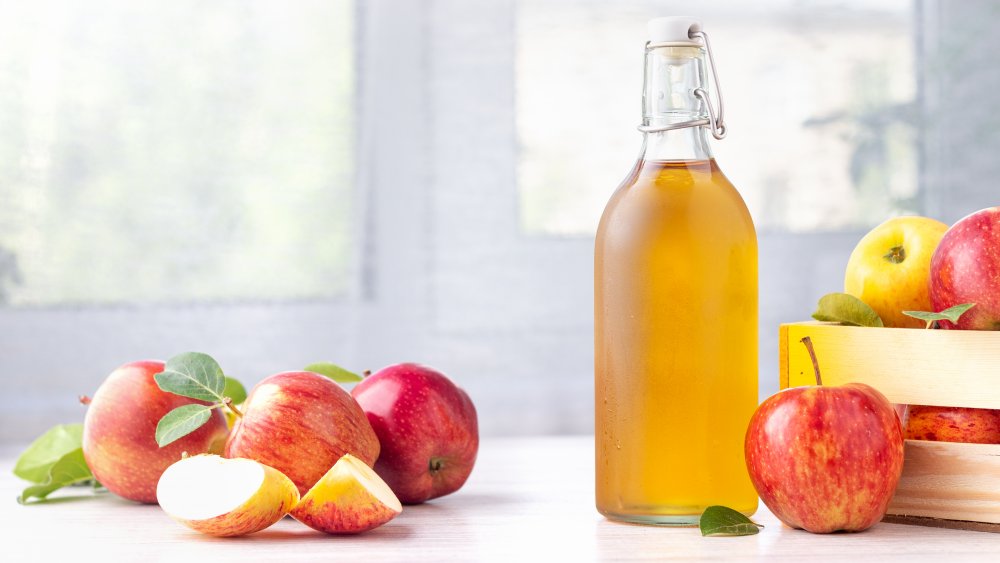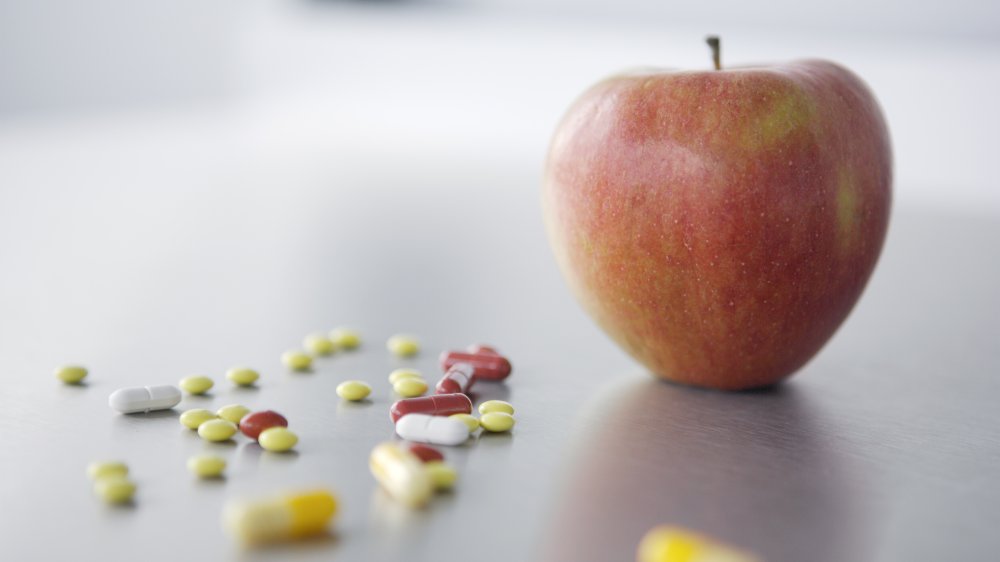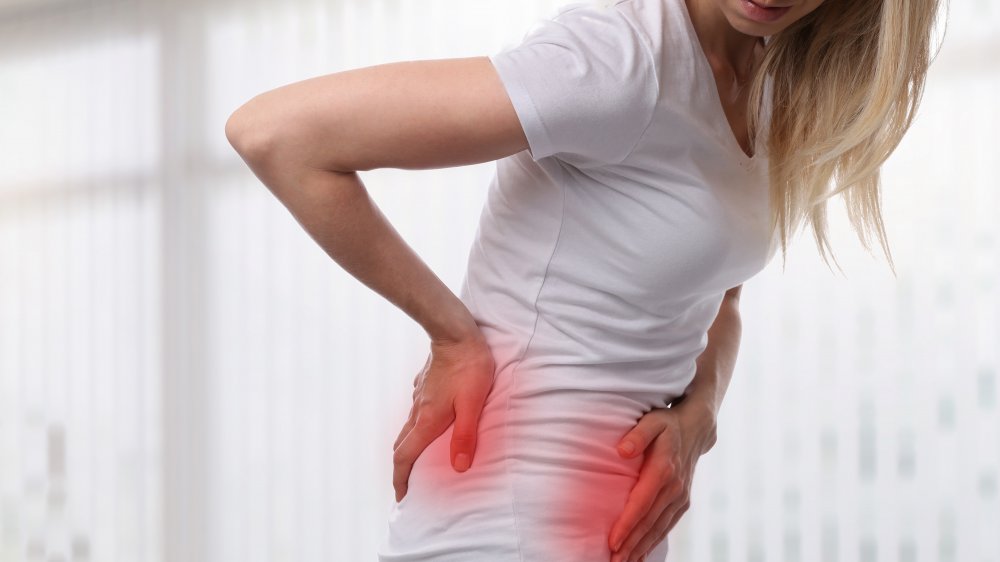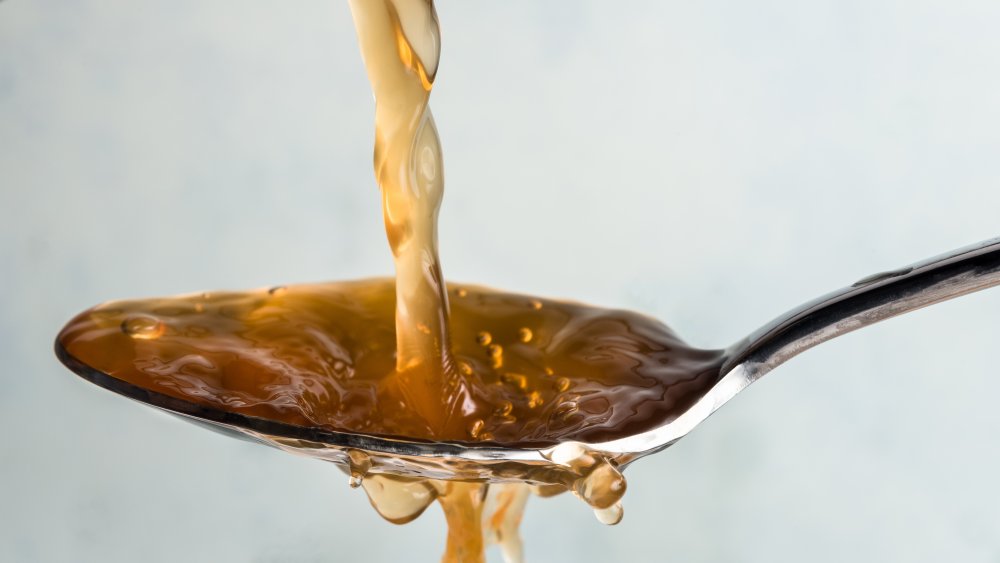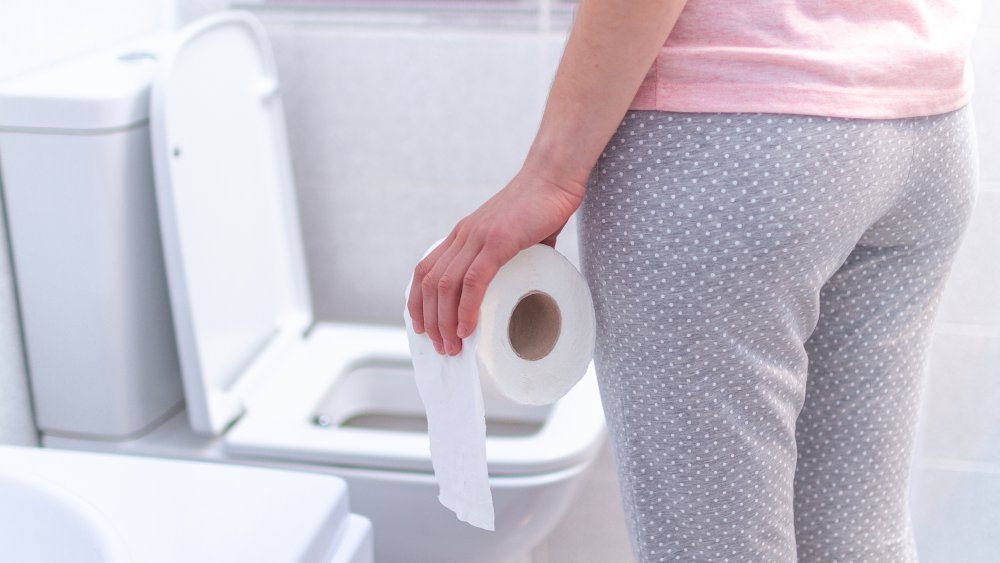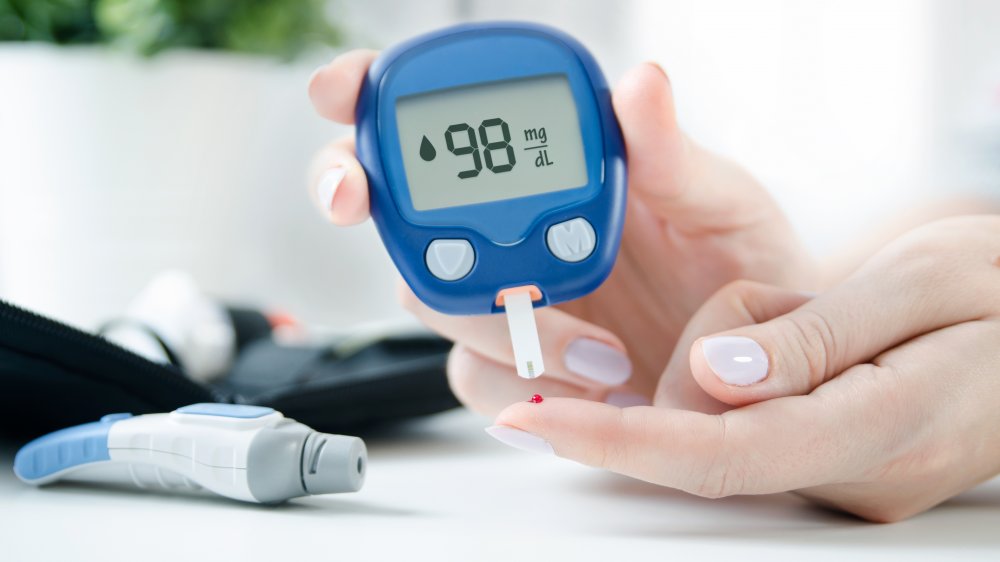What Drinking Too Much Apple Cider Vinegar Really Does To Your Body
Apple cider vinegar has become a go-to remedy for warding off colds, quelling heartburn, and boosting weight loss. Many people hail the naturally acidic elixir made with fermented fruit as an incredibly versatile ingredient and overall health hero (via Healthline). Of course, too much of a good thing is, well, not always a good thing — to put it simply.
Apple cider vinegar can be effective in small daily doses when diluted with water. Whatever you do, though, do not drink it straight. You'll also want to avoid dousing yourself with the potion and proceed with care and caution. When consumed in excess, this seemingly harmless ingredient can cause you major discomfort and have harmful consequences on everything from your teeth to your skin to your kidneys.
Yes, apple cider vinegar may have many medicinal properties, but it also yields some majorly unpleasant effects when portion control is not properly exercised. Thinking about hopping on the ACV bandwagon? To avoid paying a painful price, this is what you should know about drinking too much apple cider vinegar.
Too much apple cider vinegar can wreak havoc on your teeth
Want to keep your smile radiant? Curb the apple cider vinegar swishing or else swig it down quickly — with caution. While apple cider vinegar certainly has a rightful place in your medicine cabinet and may even be used as a natural teeth whitener, its acidic nature can do more bad than good to your pearly whites.
Jack Ringer, a California-based cosmetic dentist, explained to Well+Good that "when acids touch the teeth for a prolonged time, it can be disastrous." This is because they are proficient at wearing down the enamel of your teeth and, according to Ringer, "we don't get that enamel back." Once it's gone, it's gone for good. Enamel erosion can cause painful teeth sensitivity and turn your pearly whites a grayish hue. As such, it may even require major dental work.
So what can you do to ensure that your apple cider vinegar habit helps your health without hurting your teeth? According to Ringer, you'll want to cut your apple cider vinegar with water before using, suck the mixture through a straw, rinse with water afterwards, and avoid brushing immediately after your measured dose.
Drinking too much apple cider vinegar may interfere with certain medications
Take stock of your medications before you adopt a daily apple cider vinegar routine. As it turns out, ACV can interact, interfere, and even impede the efficacy of certain common drugs.
Diabetics who take insulin or insulin-like medications should be especially wary, as apple cider vinegar can cause their blood sugar levels to plummet when consumed in excess or even in moderate amounts. Those who take Digoxin or Lanoxin also need to be aware that apple cider vinegar could force their potassium numbers to drop way too low. Similarly, consuming too much apple cider vinegar while taking diuretics could cause a dramatic drop in potassium (via Healthline).
These are the most frequently reported interactions, but they are not the only ones. You may want to consult WebMD's list of drug interactions or ask your local pharmacist for more information. Additionally, you should always consult your doctor before starting a new health regimen, even if it is something as seemingly harmless as adding a shot of apple cider vinegar to a jug of water.
Too much apple cider vinegar may make you feel weak
According to a report published in Nephron, one woman experienced severe potassium depletion (hypokalemia) as a result of consuming one cup of apple cider vinegar cut with water daily for six years. Furthermore, diagnostic testing found that, at just 28 years old, she was also suffering from osteoporosis. Noting that high levels of acidity in the body can discourage the healthy formation and regeneration of bone, doctors deduced that an excessive intake of apple cider vinegar lead to a depletion of minerals.
While this is just one medical story, it offers ample warning to those who chug apple cider vinegar like it is plain water. A small amount will most likely not lead to bone loss, but it is possible that your potassium levels could dip down, leading to muscle weakness, cramping, and exhaustion, per Medical News Today.
As noted by the Mayo Clinic, the most concerning side effect of low potassium is an abnormal heart rhythm; it's important to consult your doctor for the best course of action to get your potassium levels up. In the meantime, you may want to lay off the ACV.
Drinking too much apple cider vinegar could cause damage to your kidneys
While a connection between apple cider vinegar and kidney problems has not been definitively confirmed, there are initial indications that those with existing conditions should take heed before downing a drink with ACV.
Registered dietitian Amanda Baker Lemein gave apple cider vinegars sippers a hearty warning when speaking with Women's Health: "There has been some research to show that if you do have any sort of weakened kidneys or immunocompromised kidneys, then consuming anything that is highly acidic is not going to be advised."
If you are insistent on keeping up with your apple cider vinegar routine, it's imperative to be cautious and dole out portions appropriately. Lemein advised to "start with 1 to 2 teaspoons of diluted ACV with 8 ounces of water and progress up to 1 tablespoon mixed with 8 ounces of water." She continued, saying, "ACV should always be diluted."
Drinking too much apple cider vinegar can lead to painful and dangerous esophageal burns
Spoiler alert: Apple cider vinegar mixed into a glass of water may not taste all that great. Furthermore, swallowing a big gulp can stir up more than an unpleasant aftertaste, it can also cause an uncomfortable tingling sensation in your throat and esophageal tract. And, no, in this case you do not want to feel the burn. This is one reason why it is important to dilute your apple cider vinegar with water — yes, even if it tastes pretty yucky. Taken straight, apple cider vinegar can cause serious and painful esophageal injuries, per Healthline.
According to one report cited by the publication, a woman who'd gotten an apple cider vinegar tablet caught in her throat claimed that for six months following the incident, her throat burned and she had continued trouble swallowing. While this can be viewed as an isolated incident, it is worth noting that one study published in Acta Paediatrica cited vinegar as a "caustic substance" that, if ingested, can lead to painful throat burns and, thus, must always be kept in "baby-safe bottles."
You could burn your skin with apple cider vinegar
Lots of people not only drink apple cider vinegar, but turn to the liquid as a skin care remedy. However, just like you need to be careful in your oral consumption, you should also tread lightly when applying the acidic product directly to your face and body.
A 2015 study published in the Journal of Clinical and Aesthetic Dermatology revealed the story of a young girl who tried to remove moles from her face using apple cider vinegar. While she actually did succeed in her extraction attempt, she also gave herself a pretty painful chemical burn.
In an interview with Everyday Health, dermatologist Nazanin Saedi warned those who seek to DIY their epidermal issues to avoid apple cider vinegar altogether as it can be too harsh and abrasive on sensitive skin. And, by the way, you are not necessarily safe from the effects of potential skin burns when you drink it down instead of pat it externally. Make sure you are diluting it properly, or you could cause ulcer-like burns to the soft tissue of your mouth and gums, The Washington Post explained.
Drinking too much apple cider vinegar could lead to bloating
If downing apple cider vinegar has you feeling perpetually full, it's no coincidence. Turns out that the ingredient can slow down the digestion process, as revealed in a 2013 report published in the International Journal of Obesity. This may result in suppressing your appetite or keeping you satiated from smaller meals for longer. However, this is not necessarily a thing to celebrate. Many people who drink apple cider vinegar report subsequent nausea spells. This often further drives a person's inability to eat.
No one wants to feel sick to their stomach all day, of course, but not everyone who drinks apple cider vinegar will go on to feel ill. Some people find that their daily intake of ACV actually helps with bloating. The medical studies are lacking, but, anecdotally, some who suffer from low stomach acid report that a little bit of the acidic drink does the trick.
As noted by Healthline, this may be due to these people having a backup of bacteria in their stomachs from a buildup of food. The apple cider vinegar can encourage stomach acid to break this all down, thus "theoretically" helping to curb bloating.
You might disrupt the regularity of your bowel movements when you drink too much apple cider vinegar
As apple cider vinegar is thought to cause a delay in digestive emptying, it may also slow your bowel habits, according to Medical News Today. However, if you consume too much apple cider vinegar, you could end up with the opposite effect: diarrhea.
As explained by Healthline, the sugar content in the vinegar can "stimulate peristalsis" (the rhythmic contracting and releasing of the intestinal muscles). Furthermore, when not properly diluted, it can "pull water out of the body into the bowel" resulting in, well, a case of the runs.
Interestingly, though, people may rely on this happening to temporarily and more naturally relieve a case of constipation. It is also important to note, per the publication, that apple cider vinegar may eliminate the healthy bacteria you want in your gut. So, if it has a diuretic effect on you, it may be wise to avoid slurping it down every day. As with most things, moderation is the key to avoiding unwanted effects.
Your acid reflux may be exacerbated by too much apple cider vinegar
If you are regularly suffering from heartburn or acid reflux, you may want to steer clear of your beloved apple cider vinegar. While some people choose to fight acid with acid, swearing that apple cider vinegar actually combats the problem, many others report that it exacerbates the issue.
As noted by Medical News Today, those who already have a sore esophageal tract will likely feel additional pain and burning. So, at the very least, avoid taking it when you are already in digestive discomfort. Moreover, if you take daily medication for heartburn or have moderate to severe symptoms of reflux or gastroesophageal reflux disease (GERD), it's wise to stop drinking apple cider vinegar. Additionally, you should talk to your doctor before resuming your regimen.
Those who only have mild or occasional symptoms, though, may want to see if the vinegar can ward off their symptoms. Medical News Today advises using less than a tablespoon in a glass of water either right before or right after eating.
You could weaken your immune system if you drink too much apple cider vinegar
If you think that a swig or two of apple cider vinegar is the answer and cure-all to every last issue, well, it's officially time for a health and wellness reality check. Registered dietitian Amanda Baker Lemein told Women's Health, "Apple cider vinegar is not this magical elixir that's going to solve all of our problems."
As noted by the publication, many people assume that since apple cider vinegar is a fermented liquid, it has probiotic properties that will improve the immune system and boost overall health. Unfortunately, unlike something like sauerkraut, it is an acid alone, meaning it probably doesn't "pack the probiotic punch" you'd actually need to make a difference.
Furthermore, consuming too much apple cider vinegar can actually eliminate nutrients and even eradicate some of the good-for-you healthy bacteria in your gut. In short, a diluted shot of ACV a day most likely won't hurt, but it may not help either.
Your appetite may seriously decrease — or increase — due to consuming too much apple cider vinegar
Drinking apple cider vinegar can affect your appetite, a report published in the International Journal of Obesity revealed. As it can slow the process of breaking down foods, you may end up feeling fuller longer. This may result in you eating less and, subsequently, lead to weight loss. As previously noted, though, consuming it in excess may also cause nausea and further hinder any hunger pangs.
A 2018 study in the Journal of Functional Foods found that people who consumed a low-calorie diet and drank apple cider vinegar lost more weight as well as had lower body mass indexes and lower cholesterol than those who exclusively dieted. Of course, you know what they say about best laid plans. They can backfire (or something like that).
As it turns out, drinking too much apple cider vinegar can also have the opposite effect on your body and eating patterns. Registered dietitian Leslie Bonci told Women's Health that while you may feel full for a while after drinking it, that is typically "because you've just consumed a gallon of water." Alas, "when you pee that out, you're going to be hungrier, sooner," she explained.
Drinking too much apple cider vinegar may put pregnant women at risk
Pregnancy is accompanied by loads of unpleasant symptoms and while soon-to-be moms are discouraged from taking many medications, they may be able to find relief in a daily dose of apple cider vinegar. Per Healthline, apple cider vinegar has been anecdotally shown to relieve morning sickness, heartburn, yeast infections, and other common afflictions expecting women frequently encounter. Still, the publication noted that "there's no research proving that ACV specifically is either safe or unsafe for pregnancy."
Nevertheless, unpasteurized apple cider vinegar in particular may present unique dangers to pregnant women. While many people prefer this "raw" variation, it can can carry illness-causing bacteria, such as Listeria.
Since your immune system is suppressed during pregnancy, you are at a greater risk for getting sick from food-borne bacteria — and it could be incredibly hard on your body and your baby's. In fact, it can increase the risk of miscarriage or stillbirth and it can even be fatal, according to Healthline. It is important to talk to your doctor about any new health regimen, of course, but it's even more critical when you're drinking apple cider vinegar for two.
If you have diabetes, you'll want to drink apple cider vinegar with caution
Those at risk of developing type 2 diabetes may want to consider adding a spoonful of apple cider vinegar (diluted) to their diets. As indicated by a report published in the European Journal of Clinical Nutrition, apple cider vinegar can help to reduce blood glucose levels and may, in some instances, "reduce ... insulin demand."
Those with diabetes, however, will need to exercise caution. It's wise to consult your doctor before adding ACV to your routine — especially if you already manage your diabetes with medication. Registered dietitian Lisa Drayer explained to CNN Health, saying, "If you're taking a diabetes drug, the vinegar could amplify the effects of your meds, and your doctor might want to adjust your dosage."
Apple cider vinegar can also interact with insulin and cause your sugar level to drop too low. Furthermore, if you have diabetic gastroparesis, a condition in which it takes the body a longer time to break down food, taking apple cider vinegar will further delay digestion, potentially causing your glucose numbers to stay higher for longer, as noted by a study published in BMC Gastroenterology. In a case like this, even a spoonful of apple cider vinegar can be too much for your body.

